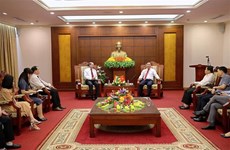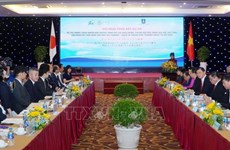Geneva Conference: Major lessons for Vietnam’s external affairs
The Geneva peace conference ended 60 years ago, leading to the signing
of an agreement that put an end to the war and restored peace in
Indochina, including Vietnam, and leaving valuable lessons that
remain practical to Vietnam’s diplomatic sector today.
The Geneva peace conference ended 60 years ago, leading to the signing
of an agreement that put an end to the war and restored peace in
Indochina, including Vietnam, and leaving valuable lessons that
remain practical to Vietnam’s diplomatic sector today.
In his article on the occasion of the 60th anniversary of the Geneva agreement, Deputy Prime Minister and Foreign Minister Pham Binh Minh came up with five lessons learnt from the Geneva conference.
The first is the lesson on regarding national interests as the goal and the highest principle in external affairs.
At the Geneva conference, Vietnam’s diplomacy, which not yet fully developed, made its presence, for the first time, at a complex multilateral negotiation forum that was dominated by world big players. The sector’s staff encountered the relations of cooperation and confrontation between the major powers and that between big and small countries, as well as calculations of interests by the participating countries.
Going through 75 negotiation days that consisted of 23 retreat meetings and 8 plenary meetings and numerous other diplomatic activities, Vietnamese diplomats were deeply aware of securing independence, sovereignty, unification and territorial integrity as the top interest and the fundamental goal at the conference.
The agreement, signed in Geneva, Switzerland, in 1954 during the conference, is the first international document acknowledging the independence, sovereignty, unification and territorial integrity of Vietnam as well as Laos and Cambodia.
The second is the lesson on maintaining independence self-reliance in external affairs, according to Minh.
The Geneva conference was held under the initiative of big players, which, for their sake, sought all means to pressure and induce Vietnam to accept a solution favouring them. The Democratic Republic of Vietnam took part in the conference as the winner of the Dien Bien Phu battle and clearly identified its negotiation goal. However, the delegation’s specific steps relating to negotiation plans, the starting and ending timing of negotiations, and collaboration between tasked forces during the negotiating course had always been intervened by powerful countries. The absence of essential communication devices at the time also posed a disadvantage. In making decisions, the Vietnamese delegation had to rely on evaluations from foreign friends, which greatly affected the country’s efforts to master the negotiation process and stay firm during the conference process.
The third lesson is on the importance of combining the military, politic and diplomatic fronts to create synergy, with the strength on the battlefield viewed as the decisive factor leading to the triumph at the talks, according to the Deputy PM.
The conference began on May 8, 1954, one day after the Dien Bien Phu Victory, which put an end to the French rule in Vietnam. According to Minh, this was a decisive element for the victory to be gained at the talks while creating a basis for Vietnam to fight for a comprehensive solution to the Vietnam issue.
The fourth is the lesson on the art of wining victory step by step, Minh said. Well understanding the country’s strength, the benefits of the powerful countries, including the Soviet Union and China, and the international context, Vietnam decided to sign the Geneva agreement with clauses yet reflecting appropriately her victory on the battlefield. The decision is seen as an example of the art of making gradual victory of Vietnam’s diplomatic sector since its fundamental goal of gaining the powerful countries’ respect for Vietnam’s independence, sovereignty, unification and territorial integrity was reached at the Geneva conference.
The fifth lesson features the close coordination between the struggles on the diplomatic front and public opinion and the gaining of support of the international community, Minh said.
At the conference, Vietnam’s efforts to strive for peace and gain national independence, unification and territorial integrity met the common aspiration of the progressive people, including those in France. Through contacts with the media and at negotiation rounds, Vietnam made the public understand more about its goodwill and plots of the hostile forces that attempted to press the country to accept a disadvantageous solution. These actions turned the justice of the Vietnamese people’s struggle into strength, creating positive support for the Vietnamese delegation at the talks.
Six decades have passed and the global and regional situation has changed, as has Vietnam’s position. The globalisation and international integration have increased mutual dependence among countries. Peace, cooperation and development have become the major trend and aspiration. However, the changing world and its complicated impacts have posed challenges for security and development of Vietnam and her external affairs in particular, Minh said.
To conclude, he quoted Party General Secretary Nguyen Phu Trong’s instructions at the 28th diplomacy conference last December as saying that the diplomatic sector should continue keeping its leading role in ensuring peaceful, favourable environment for national construction and defence and realising industrialisation and modernisation and strategic tasks on socio-economic development with a goal of turning the country into an industrialised one by 2020.-VNA
In his article on the occasion of the 60th anniversary of the Geneva agreement, Deputy Prime Minister and Foreign Minister Pham Binh Minh came up with five lessons learnt from the Geneva conference.
The first is the lesson on regarding national interests as the goal and the highest principle in external affairs.
At the Geneva conference, Vietnam’s diplomacy, which not yet fully developed, made its presence, for the first time, at a complex multilateral negotiation forum that was dominated by world big players. The sector’s staff encountered the relations of cooperation and confrontation between the major powers and that between big and small countries, as well as calculations of interests by the participating countries.
Going through 75 negotiation days that consisted of 23 retreat meetings and 8 plenary meetings and numerous other diplomatic activities, Vietnamese diplomats were deeply aware of securing independence, sovereignty, unification and territorial integrity as the top interest and the fundamental goal at the conference.
The agreement, signed in Geneva, Switzerland, in 1954 during the conference, is the first international document acknowledging the independence, sovereignty, unification and territorial integrity of Vietnam as well as Laos and Cambodia.
The second is the lesson on maintaining independence self-reliance in external affairs, according to Minh.
The Geneva conference was held under the initiative of big players, which, for their sake, sought all means to pressure and induce Vietnam to accept a solution favouring them. The Democratic Republic of Vietnam took part in the conference as the winner of the Dien Bien Phu battle and clearly identified its negotiation goal. However, the delegation’s specific steps relating to negotiation plans, the starting and ending timing of negotiations, and collaboration between tasked forces during the negotiating course had always been intervened by powerful countries. The absence of essential communication devices at the time also posed a disadvantage. In making decisions, the Vietnamese delegation had to rely on evaluations from foreign friends, which greatly affected the country’s efforts to master the negotiation process and stay firm during the conference process.
The third lesson is on the importance of combining the military, politic and diplomatic fronts to create synergy, with the strength on the battlefield viewed as the decisive factor leading to the triumph at the talks, according to the Deputy PM.
The conference began on May 8, 1954, one day after the Dien Bien Phu Victory, which put an end to the French rule in Vietnam. According to Minh, this was a decisive element for the victory to be gained at the talks while creating a basis for Vietnam to fight for a comprehensive solution to the Vietnam issue.
The fourth is the lesson on the art of wining victory step by step, Minh said. Well understanding the country’s strength, the benefits of the powerful countries, including the Soviet Union and China, and the international context, Vietnam decided to sign the Geneva agreement with clauses yet reflecting appropriately her victory on the battlefield. The decision is seen as an example of the art of making gradual victory of Vietnam’s diplomatic sector since its fundamental goal of gaining the powerful countries’ respect for Vietnam’s independence, sovereignty, unification and territorial integrity was reached at the Geneva conference.
The fifth lesson features the close coordination between the struggles on the diplomatic front and public opinion and the gaining of support of the international community, Minh said.
At the conference, Vietnam’s efforts to strive for peace and gain national independence, unification and territorial integrity met the common aspiration of the progressive people, including those in France. Through contacts with the media and at negotiation rounds, Vietnam made the public understand more about its goodwill and plots of the hostile forces that attempted to press the country to accept a disadvantageous solution. These actions turned the justice of the Vietnamese people’s struggle into strength, creating positive support for the Vietnamese delegation at the talks.
Six decades have passed and the global and regional situation has changed, as has Vietnam’s position. The globalisation and international integration have increased mutual dependence among countries. Peace, cooperation and development have become the major trend and aspiration. However, the changing world and its complicated impacts have posed challenges for security and development of Vietnam and her external affairs in particular, Minh said.
To conclude, he quoted Party General Secretary Nguyen Phu Trong’s instructions at the 28th diplomacy conference last December as saying that the diplomatic sector should continue keeping its leading role in ensuring peaceful, favourable environment for national construction and defence and realising industrialisation and modernisation and strategic tasks on socio-economic development with a goal of turning the country into an industrialised one by 2020.-VNA













